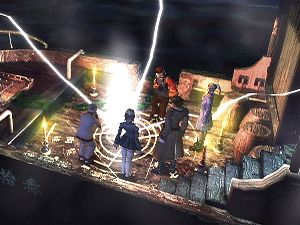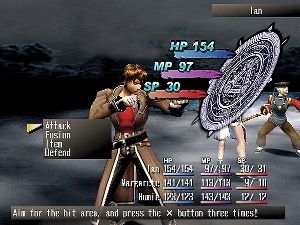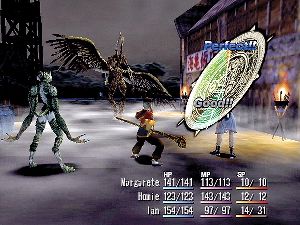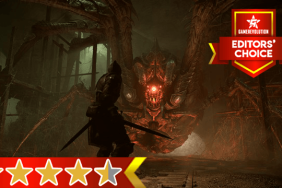Take a spin on the Wheel of Judgement!
At the turn of the 20th century, regions of China have been taken over by Japan.
Yet in the shadows, dark forces seek to wrest even greater power from the life
of a young magical girl named Alice Elliot. You play the part of Yuri Hyuga, and
you must protect Alice at all costs. Indeed, everything from the Japanese army
to demons and warlocks wants young Miss Elliot and her strange, awful powers,
and of course the fate of the world hangs in the balance.
Shadow Hearts deserves a photo next to the Dictionary’s entry for “macabre.”
This is a game where it isn’t uncommon to find yourself in a foggy mist of crimson
blood, nor is it strange to have demons running amuck just causing all sorts
of havoc.
The game is at its most interesting when it reaches for the unconventional.
How often do you get to play through an alternate-universe China filled with
denizens of both the underworld and Victorian Europe? The modern writing is
above average and is one of the highlights of the game. Despite the fact that
you can tell how things are going to play out, you still find yourself interested
in the details of how it’s going to happen.
Shadow Hearts features a classic turn-based combat system with three
active players, but there’s a twist. The fate of each and every turn is dictated
by the insidious Judgement Ring. Cue the spooky bass line.
The Judgement Ring is a dial that spins a single revolution. As the dial goes
through its cycle, you must press the button when the hand is in a highlighted
area. For example, an attack has three slices of yellow highlights. Each time
the hand is in one of those yellow slices, you hit the button.
Often, each highlighted area has a small section tinged with red. If you manage
to hit it in the red, you can eke out some stronger attacks. Every character
has a different timing rhythm for variation. Some enemies even have the ability
to increase the speed of your dial or to shorten the highlighted areas.
Unfortunately, the Judgment ring is used for damn near everything. Want to
use an item? Take a spin. Want to get a discount at the store? Spin that wheel.
Open a tightly shut door? Someone get Pat Sajak. It’s too bad they use it so
much, because it would have been great in small doses. The game rests almost
completely upon the precision of your timing with the ring.
In an effort to instill some balance, a Spirit meter depletes with every turn.
When a character runs out of Spirit, he goes ‘Berserk’ and starts indiscriminately
making his own moves. Other characters will have to step in and use their turns
to refill the crazy character’s SP meter.
 Though
Though
this battle system is interesting, it’s also very confusing, straddling the
line between action and strategy. It really ought to just make up its mind –
either have more action beyond a finger timing exercise or push the strategy
end a little more. Instead, the indecision makes for gameplay that is merely
decent and grows tiring.
To add some more depth, there’s an alternate use for the Spirit meter. Yuri
has the power of “fusion,” allowing him to call upon the demons in a hocus pocus
of transfiguration. This is Shadow Heart‘s version of summoning.
In order to gain more Fusion Demons, Yuri can traverse the mortal plane to
the “Graveyard” at save points. In the graveyard, Yuri can also quiet the malice
that builds up whenever he fights. Basically, Yuri has to take frequent trips
to the graveyard to chill out, which only manages to break up the flow of the
game. It’s like he has to take bathroom breaks or something.
The graphics are lacking, just a touch better than something you’d find on
the PSOne. Static, pre-rendered backgrounds are overlaid with poorly textured,
polygonal characters. While most of the environments capture an otherworldly
creepiness mixed with an Eastern flair, some of the backgrounds look like amateur
hour at the environment-modeling facility. This just doesn’t hold a candle to
a beauty like FFX.
The music fits the nature of the game very well, filled with distressed wails
and a moody zither. There’s a scant few voices for the major scenes. The Asian
accent inflections actually turn out well, but it’s hardly high-caliber voice
acting.
Shadow Hearts is just not very exciting. The combat can’t find a comfortable
medium between action and strategy. Graphically, it’s somewhere between PSOne
and PS2. As a story, Shadow Hearts would have made a great anime series,
but instead, it comes out as only an average game. Great for Vanna White, though.

-
Interesting, atypical story
-
Good music
-
Strong writing
-
Confused combat system
-
Weak graphics
-
Damn that wheel!







